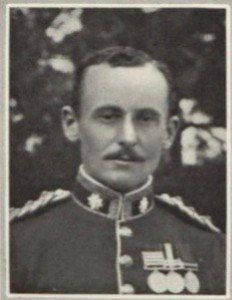
© Bond of Sacrifice findmypast.co.uk
Thank you to Lenka Cathersides for the following research.
Herbert Connell Whipple was born on 6th September 1879 at St Andrew’s Lodge in Plymouth, Devon to the South Devon Militia and South Devon and East Cornwall Hospitals surgeon Connell and Harriett (nee Batson). He was baptised on 1st October 1879 at St Andrew’s church in Plymouth. At the time of the baptism, the family lived at St Andrew’s Lodge in Plymouth.
Herbert’s maternal uncles were Dr William Lascelles Batson of Dorking, and Colonel Herbert Batson, C.B., who commanded the 2nd Battalion of the Devon’s, which formed part of the force that relieved Ladysmith in the Boer War.
Herbert’s father Connell was born in the 4th quarter of 1842 in Plymouth to general practitioner John, born about 1801 in Kingsbridge, Devon, and Sophia, born about 1810 in Titchfield, Hampshire. At the time of the 1861 Census, Connell was a medical student. At the time of the 1871 Census, general practitioner Connell lived at 4 Sussex Terrace, Plymouth. The household further comprised of Connell’s brother John, a surgeon of the Coldstream Guards, and a housekeeper and general servant.
Herbert’s mother Harriett was born about 1849 in Ross, Hertfordshire to annuitant & proprietor of houses Thomas, born about 1822, and Harriet born about 1824, both in Limehouse, Middlesex. Harriett jnr was baptised on 16th September 1842 in Sellack, Herefordshire. At the time of the baptism, the family lived at Sellack. At the time of the 1871 Census, scholar Harriett was a lodger of builder Thomas at 2 Bridge House, Lynton, Devon.
Connell married Harriett in the 2nd quarter of 1872 in Bath, Somerset.
Herbert had six siblings: Beatrice Connell born in the 2nd quarter of 1874; John born in the 3rd quarter of 1875; Connell Arthur born in the 2nd quarter of 1878; Adria Lilla born in the 3rd quarter of 1881; Phyllis Mary born in the 1st quarter of 1885 and Connell born in the 1st quarter of 1888, all in Plymouth.
At the time of the 1881 Census, the family lived at St Andrew’s Lodge, Plymouth. Connell was working as a general practitioner and Harriett was at home with their children: Beatrice, John and Herbert. The household further comprised of a nurse, middle nurse, parlour maid and housemaid.
Herbert was educated at Hartford House Preparatory School and at Rossal School.
The 1891 Census reads that Herbert Connell was a boarder and scholar of Hartford House Preparatory School at Hartley Row Street, in Hartley Wintley, Hampshire.
In 1894 Herbert Connell was a scholar of Rossall School, Fleetwood, Lancashire. At this time his family still lived at St Andrew’s Lodge, Plymouth, Devon.
At the time of the 1901 Census, Herbert’s family lived at Windsor Villas, 7 Lockyer Street, Plymouth. Connell was working as a medical practitioner and Harriett was at home with their daughters: Adria and Phyllis. The family further comprised of a cook, parlour maid, kitchen maid and two housemaids. At the time of the 1901 Census, the family was visited by Winifred A. Matthias.
Herbert was gazetted as 2nd Lieutenant to the Devonshire Regiment from the old South Devon Militia on 18th October 1899, just after the announcement of the Boer War. He served in the South African War (1899-1902), taking part in the Relief of Ladysmith, including action at Colenso; operations of 17th to 24th January 1900, and action at Spion Kop; operations in Natal of March to June 1900, including action at Laing’s Nek and those in the Transvaal, (30th of November 1900 to 31st of May 1902), receiving the Queen’s medal with four clasps and the King’s medal with two clasps.
Herbert Connell became a Lieutenant on 11th May 1901.
Herbert was also engaged with the West African Frontier Force (South Nigeria) from 1907 to 1912, receiving the King’s West African medal with one clasp. The 1907, 1909 and 1911 Passenger List Leaving UK registers read that Lieutenant Herbert Connell Whipple departed from Liverpool to Nigeria.
He became a Captain on 4th November 1911.
Herbert’s father, Connell Whipple died in the 1st quarter of 1910 in Plymouth.
At the time of the 1911 Census, Herbert’s family lived at St Andrew’s Lodge. The widowed Harriett was at home living off private means with her son Connell, niece Barbara Batson, born in Dorking, and a cook, housemaid and chauffeur, indicating that the family was in possession of a car. The house had twelve rooms. Harriett stated that she had given birth to seven children of whom five were still alive.
Captain Herbert Whipple of the Devonshire Regiment married Joan Uppleby Stapylton-Smith on 2nd July 1913 in Brentwood, Essex. At the time of the marriage, the bride’s father Gerald Uppleby Stapylton-Smith lived at Hutton Wood, Roundwood Avenue, Hutton, Brentwood. Later, he moved to Dorking.
Joan was born in the 2nd quarter of 1893 to stock exchange jobber Gerald, born about 1854 in Melton, Lincolnshire, and Elizabeth (nee Coles), born about 1861 in Eastbourne, Sussex.
At the time of the 1911 Census, Joan was attending Bentley Priory Ladies School, Harrow Weald Lodge, Stanmore in Middlesex.
At the outbreak of the war, Herbert was part of the 1st Battalion (11th Foot) the Devonshire Regiment. He disembarked on 22nd August 1914 to the Western Theatre of War.

CAPT. H. C. WHIPPLE (O.C.)
Capt. Herbert Connell Whipple (wounded) is the son of a Plymouth doctor and an O. C. He entered the Devonshire Regiment from the Militia in 1890, and took part in the relief of Ladysmith during the South African War. For this, and other services he received the Queen’s Medal with four clasps and the King’s Medal with two clasps.
Herbert Connell Whipple Casualty Notice © Gloucestershire Echo findmypast.co.uk
During the early days of the Great War, the exposure and long periods of duty without relief affected Herbert’s health, and brought back African fewer. However, he remained cheerful. He returned to the trenches in a few days, and was shot in the head on 19th November 1914 in France.
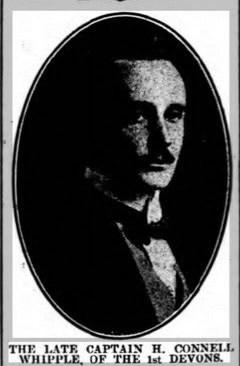
Death Notice © Dorking Advertiser findmypast.co.uk
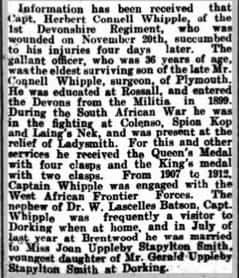
Information has been received that Capt. Herbert Connell Whipple, of the 1st Devonshire Regiment, who was wounded on November 20th, succumbed to his injuries four days later. The gallant officer, who was 36 years of age, was the eldest surviving son of the late Mr. Connell Whipple, surgeon of Plymouth. He was educated at Rossall, and entered the Devons from the Militia in 1899. During the South African War he was in the fighting at Colenso, Spion Kop and Laing’s Nek, and was present at the relief of Ladysmith. For this and other services he received the Queen’s Medal with four clasps and the King’s Medal with two clasps. From 1907 to 1912, Captain Whipple was engaged with the West African Frontier Forces. The nephew of Dr. W. Lascelles Batson, Capt. Whipple was frequently a visitor to Dorking when at home, and in July of last year at Brentwood he was married to Miss Joan Uppleby Stapylton Smith, youngest daughter of Mr. Gerald Uppleby Stapylton Smith at Dorking.
Herbert Whipple Death Notice © Dorking Advertiser findmypast.co.uk
Captain Herbert Connell Whipple died on 24th November 1914, without regaining consciousness.
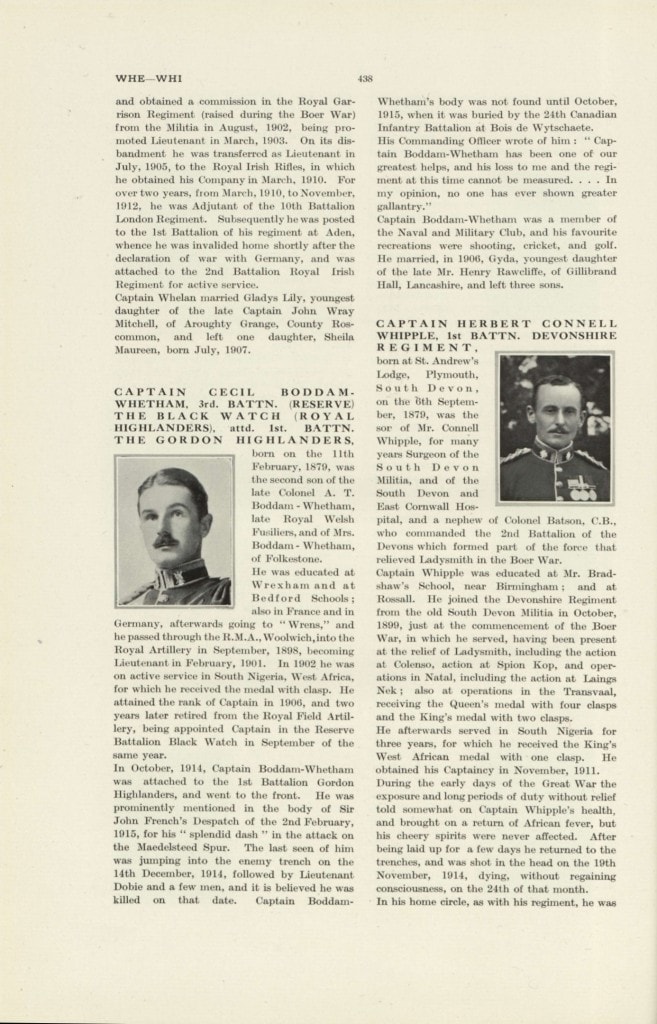
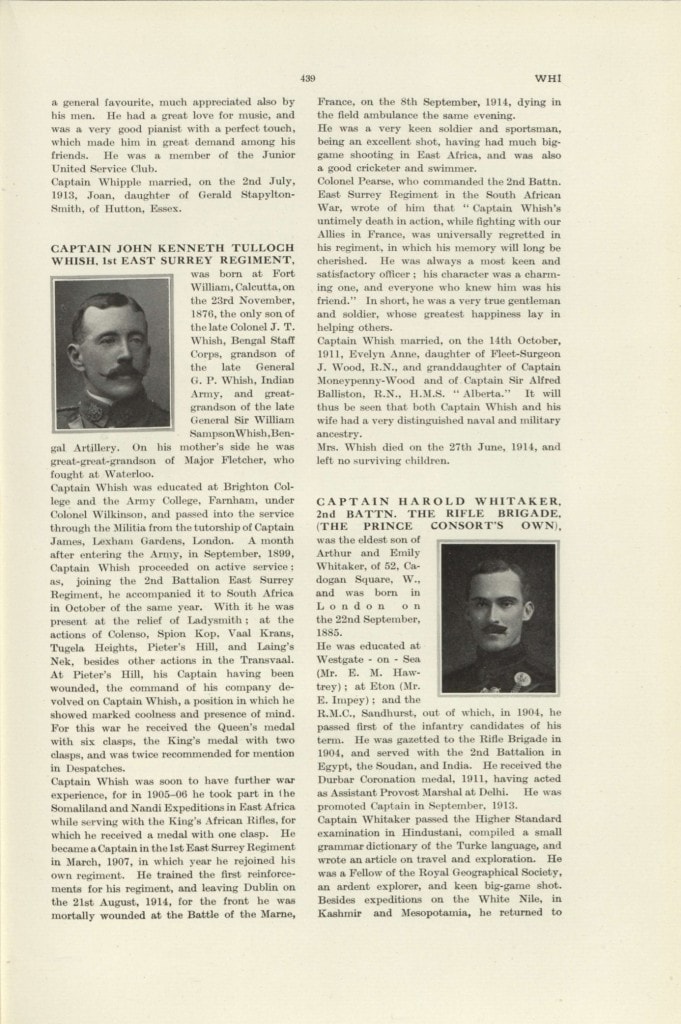
The British Army Bond of Sacrifice reads that: “in his home circle, as with his regiment, he was a general favourite, much appreciated also by his men. He had a great love for music, and was a very good pianist with a perfect touch, which made him in great demand among his friends.”
He was also a member of the Junior United Service Club. Captain Herbert Connell Whipple was a frequent visitor to Dorking when he was on leave at home. At the time of the 1911 Census, his maternal uncle, Dr William Lascelles Batson resided at 73 High Street, Dorking. The 1913 Medical Register reads that William was a general practitioner of Dorking. He died in 1921 in Dorking and was buried on 9th July 1921 in Dorking Cemetery. William’s son, Lieutenant Alfred William Batson died on 14th March 1915 near Ypres.

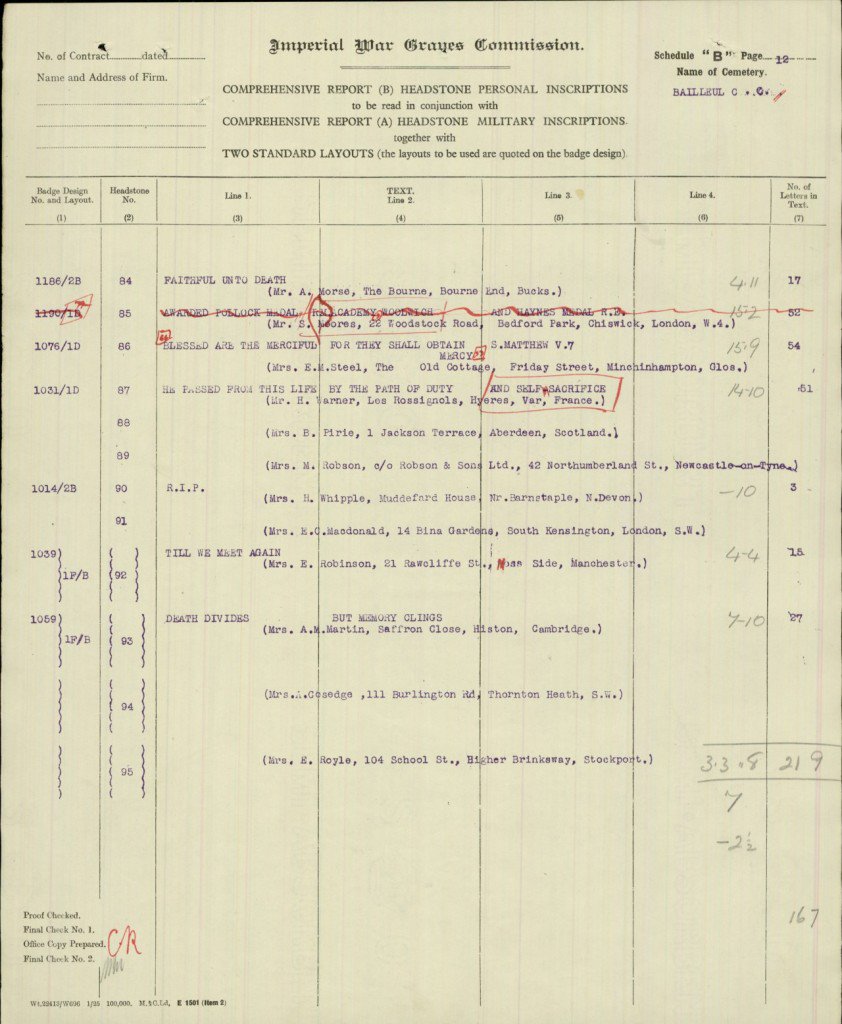
Captain Herbert Connell Whipple is buried at the Bailleul Communal Cemetery, Nord in France. His grave reference number is: D.2.3. The headstone bears the inscription: R.I.P.
Herbert Whipple of St Peter’s Barrack’s, Jersey left to his wife Joan Uppleby Whipple £2,299, 15s and 2d in probate. Joan also received £1, 3s and 9d in 1915 and a further £45 on 15th December 1925 in Soldier’s Effects.
Captain Herbert Connell Whipple received the British War and Victory medals and the 1914 Star.
Joan Uppleby Whipple became a fiancée of an English national hero Lieutenant William Leefe Robinson.
William was born on 14th July 1895 at a coffee estate of Kaima Betta, Pollibetta, South Coorg, India to Horace and Elizabeth. William was grandson of W. B. Robinson, the chief naval constructor of his Majesty’s dockyard in Portsmouth.
In August 1914 William joined the Royal Military College, Sandhurst and on 16th December 1914 he was gazetted into the Worcestershire Regiment. In March 1915 William went to France as an observer with the Royal Flying Corps. On 9th May 1915 he was wounded in the right arm by shrapnel while flying over Lille, France. As the result, William underwent pilot training in Britain, taking his certificate on 28th July 1915. Subsequently, he was trained as a night pilot, becoming attached to No39 (Home Defence) Squadron situated at Sutton Farm airfield in Essex.
On the night of 2/3 September 1916 over Cuffley, Hertfordshire, about a dozen miles north of London, William, flying a converted B.E.2 night fighter, sighted a German airship, 1 of 16 on a mass raid over England. He made an attack on attitude at 11.500 feet, approaching it from below, and closing to 500 feet, raked the wooden framed Schutte -Lanz with gunfire. The airship burst into flames and crashed into a field. (VCs of the North: Cumbria, Durham & Northumberland by Alan Whithworth)
He was the second man to shoot down a German airship, the first being Lieutenant Warneford who destroyed a Zeppelin in Belgium, and the first to do so on English soil. William received a Victoria Cross for extreme gallantry from King George V. It was the 1st Victoria Cross won by a man within UK territory.
William was also awarded Mr Joseph Cowen’s prize of £2.000. Mr Cowen offered a reward to the first British aviator to bring down a Zeppelin on British soil or in British territorial waters.
Sometime after his heroic deed William announced his engagement to Joan Uppleby Whipple.
“Joan was working in a Surrey post office, but visited Sutton’s Farm frequently with some friends from her days at Bentley Priory in Stanmore. Considering Robinson had so many admirers, there must have been something very special about Mrs Whipple. None of Robinson’s letters to her from Germany survive, but he refers to her as “the best girl on God’s earth” in a letter to his parents.” (VCs of the North: Cumbria, Durham & Northumberland by Alan Whithworth)
William was taken as a German prisoner of war in April 1917.
He died from cardiac arrest, as a result of the Great Influenza Pandemic, three weeks after his return from captivity, on 31st December 1918 at Lavender Cottage, Stanmore, Middlesex. William was weakened by his ordeal as a German prisoner of war. His sister, Baroness Heyking, and fiancée Joan nursed him until the end.
Joan’s father Gerald died in the 3rd quarter of 1918 in Dorking. He was 64 years old.
Joan remarried John Gardener Grahame Gardiner Brockbank in the 4th quarter of 1929 in St George Hanover Square, London.
Joan died in 1968 in Truro, Cornwall. She was 75 years old.
| Born | Plymouth, Devon | |
| Son of | Connell Whipple and Harriett Whipple nee Batson | |
| Husband of | Joan Uppleby Stapyton Smith | |
| Nephew of | Dr. W Lascelles Batson, Dorking doctor | |
| Regiment | 1st Battalion, Devonshire Regiment | |
| Date of Death | 24th November 1914 | |
| Place of Death | France | |
| Cause of Death | Died of Wounds | |
| Age | 35 | |
| Cemetery | Bailleul Communal Cemetery Nord, France |

